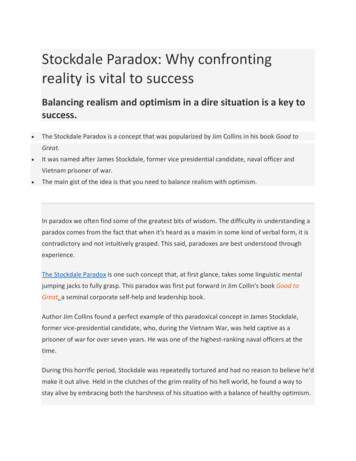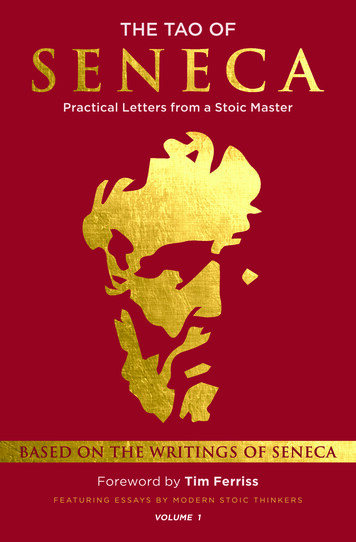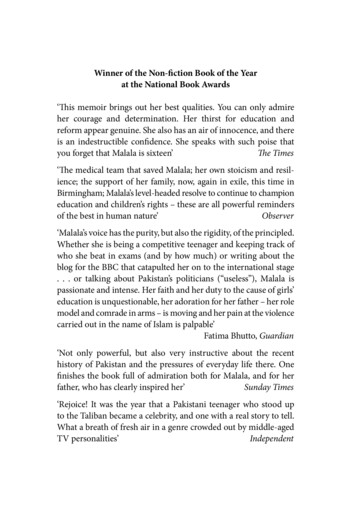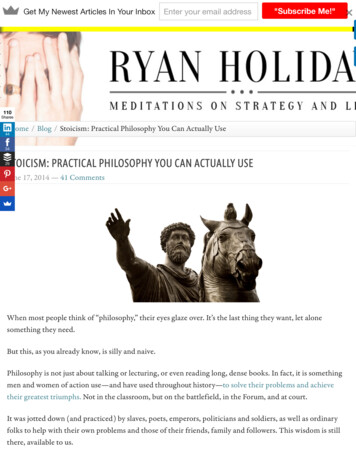
Transcription
Stockdale on Stoicism I:TheStoicWarrior'sTriadVADM JamesB. Stockdale, USN (Retired)
,*The views expressedin this report are those of the author and do not necessarily reflectthe official policy or position of the Department of the Navy, the Department ofDefense, orthe U .8. Government. This report is approved for public release; distribution unlimited.
ForewordWith this publication, the Center for The Study of Professional MilitaryEthics inaugurates its "Occasional Paper" series, and we are genuinely proudto have Vice Admiral JamesB. Stockdale as the first author we publish.Indeed, we could have had no finer or more appropriate person with whom tolaunch this new Center program.A 1947 graduate of the U.S. Naval Academy, Vice Admiral Stockdale is afigure of enormous.stature among midshipinen more than a half century later,as a living embodiment of the Navy's core values-Honor, Courage, andCommitment. In late 1999, the Center hosted Admiral and Mrs. Stockdale forseveral days, including one major event-"Moral Courage: An Evening inHonor of Vice Admiral JamesB. Stockdale." Early in 2001, the Naval Academy Alumni Association announced that Admiral Stockdale had been selectedto receive the Association's Distinguished Graduate Award. This prestigiousaward is given to a living graduateowhohas demonstrated a strong interest insupporting the Navy and the Naval Academy, has provided a lifetime ofservice to the nation, and has made significant contributions to the nationthrough public service.A long-time student and teacher of philosophy, whose special focus is onthe moral obligations of individuals, especially military officers, AdmiralStockdale asked last year if the Center would be interested in publishing someof his reflections on Stoicism and its influence on his life. We readily andenthusiastically agreed. The result will actually be our first two publicationsin this series, which we are calling Stockdale on Stoicism I and Stockdale onStoicism II. The first, this publication, is a slightly edited version of twolectures Admiral Stockdale gave to the students at the U.S. Marine CorpsAmphibious Warfare School in Quantico, Virginia on April 18, 1995. As youread this man's biography and his own words to those young Marine officers,you will no doubt conclude, as we have, that he is also the living embodimentof the Marine Corps motto, SemperFidelis .Albert C. PierceDirectorCenter for the Study of Professional Military Ethics
Vice Admiral Stockdale served on active duty in the regular Navy for 37years, most of those years as a fighter pilot aboard aircraft carriers. Shotdown on his third combat tour over North Vietnam, he was the senior navalprisoner of war in Hanoi for seven and one-halfyears -tortured 15 times, insolitary confinement for over four years, in leg irons for two.When physical disability from combat wounds brought about Stockdale'smilitary retirement, he had the distinction of being the only three-star officerin the history of the U.S. Navy to wear both aviator wings and the Medal ofHonor. Included in his 26 other combat decorations are two DistinguishedFlying Crosses,three Distinguished Service Medals, four Silver Star medals,and two Purple Hearts.As a civilian, Stockdale has been a college president (a year as Presidentof The Citadel), a college teacher (a lecturer in the philosophy department ofStanford University), and a Senior ResearchFellow at the Hoover Institutionat Stanford for 15 years, a position from which he is now Emeritus. Hiswritings all converge on the central theme ofhow man can rise in dignity toprevail in the face of adversity.Besides numerous articles, he co-authored the book, In Love and War,with his wife, Sybil (Harper and Row, 1984), now in its second revised andupdated edition (Naval Institute Press, 1990). NBC produced a dramatizedversion of this book which appearedin 1987, starring JamesWood and JaneAlexander. Admiral Stockdale has also written two books of essays:A netnam Experience: Ten Yearsof Reflection (Hoover Press, 1984), and Thoughtsof a Philosophical Fighter Pilot (Hoover Press, 1995). Both of the latter wonthe Freedom Foundation at Valley Forge's George Washington Honor Medalfor books.Upon his retirement from the Navy in 1979, the Secretary of the Navyestablishedthe Vice Admiral James Stockdale Award for Inspirational Leadership, which is presented annually to two commanding officers, one in theAtlantic Fleet and one in the Pacific Fleet. In 1989, Monmouth College in hisnative state of Illinois, from which he entered the Naval Academy, named itsstudent union "Stockdale Center." The following year he was made a 1990Laureate of the Abraham Lincoln Academy in Illinois in ceremonies at theUniversity of Chicago. He is an Honorary Fellow in the Society of Experimental Test Pilots. In 1993 he was inducted into the Carrier Aviation Hall ofFame, and in 1995 was enshrined in the U.S. Naval Aviation Hall of Honor atthe National Museum of Aviation in Pensacola,Florida.Admiral Stockdale holds II honorary degrees.
A lecture to the student body ofThe Marine Amphibious Warfare School,Quantico, VirginiaTuesday, 18 April 1995I feel at home here. I've flown combat with Marines in their own airplanes-VMF2l2 out of Kaneohe. I was Wing commander of the carrierOriskany on its 1965 cruise. One of our Fighter Squadronswas transitioningfrom F8 Crusadersto F4s. The gap was filled by the Marine F8 squadron.The skipper was Lieutenant Colonel Chuck Ludden, the Executive Officerwas Major Ed Rutty, former Blue Angel. And my wingman in the squadronwas a First Lieutenant named Duane Wills (later a Lieutenant General andhead of Marine Cows Aviation). I spent 71hyears in prison with my shipmateMarine Captain Harley Chapman, who was shot down two months after I was.So I'm in familiar territory, and damned glad to have spent 37 years in theNaval Service with the likes of guys like you.Now, that said, I've got to choose my words well and get to the point if weare to get anything out of this morning. We're going to take some big stepsright away. What kind of a racket is this military officership? Let's go rightto the old master, Clausewitz. He said: "War is an act of violence to compelthe enemy to do your will." Your will, not his will. We are in the business ofbreaking people's wills. That's all there is to war; once you have done that,the war is over.And what is the most important weapon in breaking people's wills? Thismay surprise you, but I am convinced that holding the moral high ground ismore important than firepower. For Clausewitz, war was not an activitygoverned by scientific laws, but a clash of wills, of moral forces. He wrote:"It is not the loss in men, horses, or guns, but in order, courage, confidence,cohesion and plan which come into consideration whether the engagementcan still be continued; it is principally the moral forces which decide here."Moralforces! Conviction! Mind games!I had the wisdom of Clausewitz' stand on moral integrity demonstratedtome throughout a losing war as I sat on the sidelines in a Hanoi prison. To take anation to war on the basis of any provocation that bearsthe smell of fraud is torisk losing national leadership's commitment when the going gets tough. Whenour soldiers' bodies start coming home in high numbers, and reversesin thefield are discouraging, a guilty consciencein a top leader can become theAchilles heel of a whole country. Men of shamewho know our road to war wasnot cricket. are seldom those we can count on to hold fast, stay the course.
As some of you know, I led all three air actions in the Tonkin Gulf affair inthe first week of August 1964. Moral comers were cut in Washington in ourtop leaders' interpretation of the events of August 4that sea in order to get theTonkin Gulf Resolution through Congress in a hurry. I was not only the soleeyewitness to all events, and leader of the American forces to boot; I wascognizant of classified messagetraffic pertaining thereto. I knew for sure thatour moral forces were squanderedfor short-range goals; others in the know atleast suspectedas much.Mind gamesare important, and you have to play them honestly and seriouslyin this business. Clausewitz' battlefield enemy Napoleon not only agreedwithhis adversary,he made the samepoint of ethics in even more vivid terms.Napoleon said: "In war, the moral is to the physical as three is to one."I'm going to concentrate on a major mind game today: Stoicism. Its seedswere planted in fourth century (B.C.) Athens, as a backlash against Plato'spreoccupation with inuring everybody to the perfect society. Diogenes ofSinope, a friend of both Aristotle and Alexander the Great, (they all kneweach other and all died within a two-year period), struck out on his campaign,not to conquer the East as did Alexander, not to stamp out ignorance as didAristotle, but to do something about man s condition as a cowed citizen of acity state, without anything to believe in that could defuse the inner fearsand desires which continually obsessedhim. Man had to take command ofhis inner selj; control himself. The Stoic goal was not the good society, butthe good man!And a lot of movements sprang up, mainly in the East, after the prematurecrumbling of Alexander the Great's empire in Asia after his early death;dozens of cults designed to improve men's souls organized themselves andheadedWest from Athens-among others Epicureans, of course the Stoics,and finally, almost bringing up the rear, the Christians.To get my messagetoday, you have only to have a general understanding ofthe messageof one man: the Stoic philosopher Epictetus, the outstandingpagan moralist of the Roman Empire. I'll do my best to give you that understanding in a couple of 50-minute talks with a break in between. And for theremaining time, mainly through questions and answers, we'll discuss theworthiness ofwhat I'll call Epictetus's "Code ofConduct" to be part ofus aswarriors. Code of Conduct? You thought Stoicism was a whole philosophywith a certain cosmology, a unique logic, a physics, a theory ofknowledge,and all the rest? If so, you are right, it has all the accoutrementsof a philosophy; it's just that Old Man Epictetus ignored everything about it except whatit had to say about personal conduct, how the good man should think, andbehave. "What do I care," Epictetus asked, "whether all existing things arecomposed of atoms, or of indivisibles, or of fire and earth? Is it not enough tolearn the true nature of the good and the evil?"
The first principle of Stoicism is to live in hamlony with nature-humannature and physical nature. My geneticist friend at Harvard, E. 0. Wilson,tells me that the difference between men and animals is not reason, but humannature. Human nature is mostly genetically driven passions, passions designed to give us the capacity to survive and reproduce. It was David Humewho said, "Reason not only is but ought to be the slave of passions." Physicalnature, the other half, is the physical universe and all its interactions. To theStoic, physical nature is God's body. Have a look at yourself and seewhereyou fit into the natural scheme of things. And play the part well.Epictetus was impatient with unmanliness and loose living. He had asarcasmthat stripped affection bare. He had a fiery earnestness,which robbedhis rude strokes of their cruelty. His message: " A man must think hard andlive simply to do well."I met old Epictetus back in graduate school in 1962. It was my great luck;in fact, it was a fluke that put us together. My favorite (philosophy) professorgave me one ofEpictetus's books as a farewell present as I left to go back tosea. He had never mentioned him in class. Phil Rhinelander just thoughtEpictetus and I would make a good pair, and he was certainly right. I hadnever heard of Epictetus; in fact, today his name recognition is in about thethird tier of philosophers. But his mind is first tier .Everything I know about Epictetus I've developed myself over the years.It's been a one-on-one relationship. He's been in combat with me, leg ironswith me, spent month-long stretchesin blindfolds with me, has been in theropes with me, has taught me that my true businessis maintaining controlover my moral purpose, in fact that my moral purpose is who I am. He taughtme that I am totally responsible for everything I do and say; and that it is Iwho decides on and controls my own destruction and own deliverance. Noteven God will intercede ifHe seesme throwing my life away. He wants me tobe autonomous. He put me in charge of me. "It matters not how straight thegate, how charged with punishment the scroll. I am the master of my fate, Iam the captain of my soul."Don't be disturbed about my occasional references to the way the StoicsseeGod. He's the closest thing to the Christian God there is, according toPaul Tillich, a renowned Protestant theologian. Epictetus had heard of Christians, but he never knew any, nor were the Christians and the Stoics in competition in his lifetime. It was not until the latter part of the second century A.D.that a coherent Christian creed was beginning to emerge. Before that, nobodycould state a causefor Christianity that would be intelligible to the paganintellectual. The Stoics practiced a monotheistic religion from which Christianity borrowed much-the fatherhood of God and the brotherhood of manwere well-established Stoic concepts before Christ was born; the Holy Ghostwas a Stoic idea before Christ was born.
A quick thumbnail sketch ofEpictetus's life goes like this: He was bornto a Greek-speaking slave woman in a little town in Asia Minor, up in the hillsbehind Ephesusabout a hundred miles. At the time he was born, 50 A.D., thatpart of the world was a Roman colony with garrisoned troops. His mother'stown, Hieopolos, was then and still is renowned for its natural hot springs andbaths, and I think of it as probably an R and R spot for Roman troops. (I'vevisited there, of course.) Born to a slave, Epictetus was automatically a slave;he had a tough life. Crippled by a cruel master, he had a bad leg just likemine-Ieft leg at the knee. When he was about 15, he was chained up andcarried away in a slave caravan bound for Rome. He was bought at auction bya former slave, a "freedman" named Epaphroditus, secretary to the Emperorof Rome, the young (27-year-old) squirt Nero. Nero was bad and gettingworse by the time young Epictetus moved into the Roman "White House." Bythe time Nero was 30, he had killed his half brother, his first wife, secondwife, and mother. And he was letting the Empire run itself. The RomanSenatedeclared him a public enemy, and Epaphroditus was at Nero's side asthe army was breaking down the door to arrest the Emperor. Nero tried'to cuthis own throat, muffed it, and Epaphroditus finished the job. Epaphroditusforever thereafter lived under a cloud, and Epictetus just took to the streets ofRome. A high-minded, intelligent, Greek-speaking, young man, he startedattending philosophy lectures given in the public parks. And in those days inRome, "philosophy" was synonymous with Stoicism.The turning point in his life was his adoption by Musonius Rufus, the verybest teacher of philosophy in first-century Rome. Though Epictetus was stilltechnically a slave, Rufus, an Etruscan knight, took him as a student. Rufuswas as fluent in Greek as he was in Latin, and he and Epictetus got on well.In one passage,Epictetus tells ofhis tutor's mastery of seminar instruction:"Rufus spoke in such a way that each of us, as we sat there, fancied someonehad gone to him and told him of our faults; so effective was his grasp of whatmen actually do and think. So vividly did he set before each man's eyes hisparticular weakness."Epictetus's tutelage ran on for at least 10 years, and then Rufus launchedhim on a career as a bonafide philosopher of Rome. Epictetus, like all philosophers in Rome, was exiled by Emperor Domitian in the year 89 A.R, andhe picked out a little town ofNicopolis (where I've also been), on the Adriaticcoast of Greece, as a place to found a school. My favorite authorities set thedate ofhis death at 138 A.D., at age 88. I've come acrossnothing about his"retirement," so I think of him as starting his school in about 90 A. D. at age40, and teaching there for another 40 or 50 years. This little book like the oneI got from my professor in 1962 is called The Enchiridion, meaning in Greek"ready at hand." It is only selected excerpts from eight volumes ofEpictetus'slectures and conversations given, we think, in the year 108 A.D. He wastalking to basically rich, young men from formidable families, mostly from
Athens and Rome. It was the Socratessceneallover again, 500 years laterthe same students, same age, mid-20s, the same type of dialogue.Epictetus, a bachelor until his very late years when he took a wife his ageto help him care for an infant he rescued from death by "exposure," was a"natural," extraordinarily gifted teacher. He was gregarious-never missedthe Olympic games which were conducted only about 50 miles from hisschool. He talks about the Olympics of those years in Enchiridion [29]:In every affair, consider what precedes and what follows, and thenundertake it. Otherwise you will begin with spirit, indeed, careless ofthe consequences,and when these are developed, you will shamefullydesist. I would conquer at the Olympic Games. But consider whatprecedesand what follows, and then, if it be for your advantage, engagein the affair. You must conform to rules, submit to a diet, refrain fromdainties; exercise your body, whether you choose it or not, at a statedhour, in heat and cold; you must drink no cold water, and sometimes nowine. In a word, you must give yourself up to your trainer as to a physician. Then, in the combat, you may be thrown into a ditch, dislocateyour arm, turn your ankle, swallow an abundanceof dust, receive stripes[for negligence], and after all, lose the victory. When you have reckonedup all this, if your inclination still holds, set about the combat.The religious possibilities of Stoicism were developed further by Epictetusthan by any of his Stoic predecessorsover the previous 400 years. But hismanner of speaking was not that of a prissy moralist. He often phrased hispithy remarks in the athletic metaphor: "Difficulties are what show men'scharacter. Therefore when a difficult crisis meets you, remember that you areas the raw youth, with whom God-the-trainer is wrestling." And in a prayer toGod, he uses the military metaphor: "If Thou sendestme to a place wheremen have no means of living in accordancewith nature, I shall depart this life,not in disobedience to Thee, but as though Thou were sounding for me therecall." The Stoics accepted suicide, under certain conditions.And he was funny. Funny, even as he played the part of shock psychologist!He asksand answersthe question: What do you do for friends as you ascendtheladder of intellectual sophistication? Do you hang in with your old pals, orconcentrateon intellectual peers? "If you do not drink with old friends as youused to drink with them, you cannot be loved by them as much. So choosewhether you want to be a boozer and likeable to them, or sober and not likeable." Then he makes it clear that in his mind, satisfaction and self-respectarebest servedby escalatingfriendships apacewith your education. "But if thatdoes not pleaseyou, turn about the whole of you, to the opposite; become oneof the addicts to unnatural vice, one of the adulterers,and act in correspondingfashion. Yes, and jump up and shout your applauseto the dancer!"
To the painfully shy and reticent studentAs the good chorus singers do not render solos, but sing perfectlywell with a number of other voices, so some men cannot walk around bythemselves. Man, if you are anybody, both walk around by yourself, andtalk to yourself, and don't hide yourself in the chorus. Let yourself belaughed at sometimes, look about you, shake yourself up, so as to atleast find out who you actually are!Now neither these eight volumes of Epictetus "lectures," hallway talk, andprivate conversations, nor their "executive summary," The Enchiridion, werecompiled by Epictetus. He couldn't have cared less about being in print.They were taken down in some kind of frantic shorthand by a 23-year-oldstudent, a remarkable man, Flavius Arrianus, usually known asjust Arrian.He was an aristocratic Greek born in a Black Seaprovince of Asia Minor.You can't help but imagine what it took for him to improvise this shorthandand follow the old man around and take down all that material. After gettinga load of Epictetus and his "living" speech,he must have said something like:"Wow, we've got to get this guy down on papyrus!" In his dedication ofhisfinal manuscript to a friend, he writes: "Whatever I heard him say, I used towrite down, word for word, as best I could, endeavouring to preserve it as amemorial, for my own future use, of his way of thinking and the frankness ofhis speech. Let those who read these words be assuredof this: that whenEpictetus spoke them, the hearer could not help but feel exactly whatEpictetus wanted him to feel."That is the mark of a good teacher!Arrian was a writer throughout his life. His last and largest book was hisdefinitive text on Alexander the Great's expedition to the east: The Anabasisof Alexander. Some time after his death, four of his eight volumes ofEpictetus disappeared. During the Middle Ages the four remaining werebound under the title Epictetus's Discourses. As I said, The Enchiridion wastidbits from all eight volumes, so you'll find things in The Enchiridion that arenot in Discoiurses.History gives us snapshotsof Arrian 's other activities in his illustriouscareer. After leaving Epictetus's school, and a tenn as a successful Romananny officer, we find him lecturing in Athens in about 120 A.D., and theremeeting Roman Emperor Hadrian, who was about to start a five-year tour ofthe Empire following his investiture in 117 A.D. Epictetus figured into twofallouts of Arrian 's presence in Athens in the years following. Hadrian, in 130A.D., appointed Arrian consul for a year, followed by six years as governor ofthe large province of Cappadocia in Asia Minor. Arrian introduced Epictetusto Emperor Hadrian and they became lifetime friends. Secondly, when Arrianvacated his lectureship in Athens for politics, he was relieved by a Q. Janius
Rusticus, who later became the tutor to the young Marcus Aurelius. Later,in his book Meditations, a book on Stoicism, Emperor Marcus Aureliusacknowledged his debt to Epictetus for the wisdom he gained from studyinghis eight volumes as a youth. (Rusticus had some copies Arrian left him andgave one to his student, young Aurelius. )So this slave boy who becamea schoolmaster,gained fame as a respectedscholar in the highest circles of the only superpowerof the ancient world. Andthose were important years in world history. They are the years the Englishhistorian Edward Gibbon was talking about in the famous statementin his book,The History of the Decline and F all of the Roman Empire: "If a man werecalled upon to fix the period in the history of the world during which the condition of the human race was most happy and prosperous,he would withouthesitation name that which elapsedfrom the accessionofNerva to the death ofMarcus Aurelius." That comesto a period of 84 years, from 96 A.D. to 180A.D. "Their united reigns are possibly the only period in history in which thehappinessof a great people was the sole object of government."The eminent old philosopher Will Durant, in the volume named "Caesarand Christ" in his History of Civilization series, calls the five emperors spanning the era that Gibbon admired, "the philosopher kings." All were Stoics orhad strong Stoic sympathies: Nerva pardoned exiled Stoics of the Domitianreign. Trajan had a Stoic tutor in his quarters. Hadrian was Epictetus's closefriend. Antonius Pius, a "product of the Stoic school," insisted that in Romanlaw courts, Stoic legal principles be followed, i.e. that (I) in all casesofdoubt, judgments be resolved in favor of the accused,and (2) a man should beheld innocent until proven guilty. And the last of the philosopher kings,Marcus Aurelius, probably the finest of all Roman Emperors, secretly wrotehis Stoic Meditations by candlelight in his tent perched on one or another ofthe mountainsides of Germany, where for the last 12 years ofhis life he was inthe field as Commanding General of the Roman armies, continually engagedin defending the northern frontiers of the Empire against tribal attacks.The Roman Stoic was more a man of action than contemplation, but listento the paragraph of old soldier Aurelius on how to die: "Pass this little spaceoftime- -your lifetime-comfortably, with nature, and end thy journey incontentment, like the ripe olive that falls, praising the earth that gave birth toit, and thanking the tree that made it grow."On the question of afterlife, Marcus Aurelius took up and emphasizedtheteaching of Epictetus. They alone, among Stoics, were very careful in whatthey said about death. There was no proof of afterlife, and rather than possibly mislead people, they refrained from the more ample language of theirpredecessors. Matthew Arnold described Marcus Aurelius as "perhaps, themost beautiful figure in history."
The five Stoic philosopher kings were the sort of men you would want tohave as Marine Corps Commandants. A few notes from my history books:The second of the five, Trajan, was Commanding General of the Roman armyin Cologne when he was notified that Emperor Galba had died, and that hisnumber was up. He was Emperor for 19 years, and throughout, habituallywore his army uniform. Tall and robust, he was wont to march on foot withhis troops and ford, with full kit, the hundreds of rivers they crossed.Let me tell you about that five-year trip his successor,Emperor/GeneralHadrian, took after meeting Arrian in Athens. Accompanied by experts,architects, builders, and engineers, he had left Rome in 121 A.D. to inspectdefensesin Germany. He lived the life ofhis soldiers, eating their fare, neverusing a vehicle, walking with full military equipment 20 miles at a time. TheRoman army was never in better condition than in his reign. He traveled theRhine to its mouth, sailed to Britain, ordered the building of a wall fromSolway Firth to the mouth of the Tyne "to divide the barbarians [Scots] fromthe Romans [in England]"-"Hadrian's Wall." Back to Gaul, then to Spain,then down into Northwest Africa where he led some garrisoned RomanLegions against Moors who had been raiding the Roman towns of Mauretania.That finished, he boarded one of his Mediterranean warships and went toEphesus,went up and inspected the ports of the Black Sea,back down toRhodes, and still curious at 50, stopped in Sicily and climbed Mt. Etna to seethe sunrise from a perch 11,000 feet above his Mediterranean Sea.*****The time interval between my finishing graduate school and becoming aprisoner was almost exactly three years, September 1962 to September 1965.That was a very eventful period in my life. I started a war (led the first-everAmerican bombing raid on North Vietnam), led good men in about 150 aerialcombat missions in flak, and throughout three 7-month cruises to Vietnam Ihad not only the Enchiridion, but the Discourses on my bedside table on eachof the three aircraft carriers I flew from. And I read them.On the 9thof September 1965, I flew right into a flak trap, at tree-top level,500 knots, in a little A-4 airplane--cockpit walls not even three feet apartwhich I couldn't steer after it was on fire, control system shot out. Afterejection I had about 30 secondsto make my last statement in freedom before Ilanded on the main street of that little village right ahead. And so help me, Iwhispered to myself: "Five years down there at least. I'm leaving the worldof technology and entering the world of Epicetus."I want to step off the chronology escalator for just a minute and explainwhat memories of the Enchiridion and Discourses I did have "ready at hand"when I ejected from that plane. What I had in hand was the understandingthat the Stoic, particularly the disciple of Epictetus who developed this8
accounting, always keeps separatefiles in his mind for: (a) those things whichare "up to him" and (b) those things which are "not up to him;" or anotherway of saying it, (a) those things which are "within his power" and (b) thosethings which are "beyond his power; " or still another way of saying it: (a)those things which are within the grasp of "his will, his free will," and (b)those things which are beyond it. Among the relatively few things that are"up to me, within my power," within my will, are my opinions, my aims, myaversions, my own grief, my own joy, my moral purpose or will, my attitudetoward what is going on, my own good, and my own evil. Pleasenote: Allthese things, as are all things of real importance to the Stoic, are matters thatapply principally to your "inner self;" where you live.Now I'm talking like a preacher here for a bit. Pleaseunderstand that I'mnot trying to sell anything; it's just the most efficient way to explain it. stoicism is one of those things that, when described analytically, sounds horribleto some modem people. Stoic scholars agree that to describe it effectively,the teacher must "become, for the time being at least," a Stoic.For instance, to give you a better feel for why "your own good and yourown evil" are on the list, I want to quote Alexander Solzhenitsyn from hisbook Gulag Archipelago, when he talks about that point in prison when hegets his act together, realizes his residual po ers, and starts what I know as"ascending," riding the updrafts of occasional euphoria as you realize you aregetting to know yourself and the world for the first time.It was only when I lay there on the rotting prison straw that I sensedwithin myself the fIrst stirring
for books. Upon his retirement from the Navy in 1979, the Secretary of the Navy established the Vice Admiral James Stockdale Award for Inspirational Leader- . warriors. Code of Conduct? You thought Stoicism was a whole philosophy with a certain co







